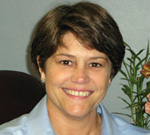A Caring Milestone
AIDS Foundation Houston marks 25 years helping people infected with and affected by HIV/AIDS. At this quarter century point in the pandemic, agency CEO Kelly McCann launches a new column for OutSmart.

By Kelly McCann, CEO AIDS Foundation Houston
See also
• AFH Timeline (expanded web version)
• AIDS Foundation Now: new agency programs & initiatives (web only)
Twenty-five years ago this month, a group of determined and compassionate medical professionals and gay community activists (including the late Jay Hollyfield, current City Council member Sue Lovell, and icon Ray Hill) founded AIDS Foundation Houston (AFH) in order to provide emotional and in-home support to men who were dying of a new, horrible disease, AIDS. The KS/AIDS Foundation, as it was known at the time, was the first AIDS service organization in Texas and one of the first in the country. Over the next quarter of a century, as we responded to the changing landscape of the HIV epidemic, there would be many other “firsts” and innovations associated with AFH.
For example, AFH co-produced the country’s first educational booklet on AIDS and distributed 20,000 copies in June and July of 1982. The next year, when it became evident that men with AIDS often lost their jobs and homes, AFH opened McAdory House, the first privately funded residence in the United States for people with AIDS. A few years later, we learned about wasting syndrome and the need for proper nutrition for people with HIV/AIDS. So on Valentine’s Day 1987, AFH opened our Stone Soup food pantry. (Today, Stone Soup is the only remaining AIDS food assistance program in the Houston area.)
In order to increase awareness of HIV/AIDS and to raise much-needed funds for programming, AFH organized the first AIDS walk event in Houston in 1990. (Then called “From All Walks of Life,” this grassroots event has grown into our AIDS Walk Houston, which attracts 10,000 walkers annually.)
Time and the epidemic marched on, and it soon became clear that HIV was infecting more than just gay men. We began to see injection drug users and heterosexual men and women becoming infected. Then we saw that children were being born with HIV, too. Through our experiences and interactions with families living with HIV, we came to see that HIV+ children were not allowed to attend traditional summer camps with other children. So in 1996, AFH created Camp Hope, the first camp for HIV-infected children in Texas. (Today, AFH hosts both Camp Hope and Camp H.U.G., a weekend family camp, and we fund and convene international camps in Romania, Botswana, and Malawi.) In 2006, we launched our first Teen Leadership Forum for HIV+ youth.
In the late 1990s, research indicated there was a much greater incidence of HIV within incarcerated populations than in the general population. AFH, working with the Texas Department of Criminal Justice, created a peer-education program for offenders. Then, in 2002, AFH convened the first peer- education conference for offenders within Texas prisons. This conference was not only the first of its kind in Texas, but it was the first of its size and scope in the nation.
When needs assessments indicated safe, affordable, and permanent housing was a critical need for persons and families living with HIV/AIDS, we took action. In 2001, AFH developed a collaborative effort with Habitat for Humanity Houston, wherein we joined forces to build homes for families living HIV/AIDS. This was the first time Habitat had ever partnered with an AIDS service organization.
As you can see from the partial list of our “firsts,” innovation has always been a cornerstone for AFH in our develop- ment of events, funding initiatives, and programs and services designed to meet the needs of the growing HIV-infected and -affected population in Houston. Today, our commitment to innovation is still evident, even within our mission statement: To create a positive social impact through the innovative management of HIV/AIDS and other chronic diseases.
As we celebrate 25 years of service to the community, we will look not only at our past, but we will examine where we are today and plot our future. We will continue to serve those living with HIV/AIDS, providing food, housing, and other supportive services to enhance their lives. We will continue to watch the epidemiologic trends, gauge client needs, and develop new and innovative programs to meet those needs. We will continue to provide prevention information to persons at high risk for HIV infection and to the community at large. However, we could do none of that without the support of individual Houstonians, community groups, and local businesses and publications such as OutSmart.
As we at AFH embark upon our next 25 years, we are honored to have a new partnership with OutSmart. Beginning this month, you will see an AFH monthly column that will provide updated information on HIV/AIDS and the organizations that serve Houstonians living with, or at risk for, HIV infection.
Thanks to our founders and the extremely supportive Houston community, we at AFH can proudly say, We’ve been here for 25 years and we’ll be here tomorrow. And together, we can end HIV/AIDS.
SEE ALSO
• AFH Timeline (expanded web version)
• AIDS Foundation Now: new agency programs & initiatives (web only)










